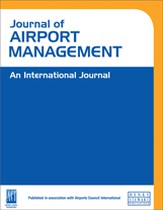US airports’ perspective on airlines’ fleet mix and its impact on capacity
Abstract
The 1978 airline deregulation contributed to an increase in air travel and a change in airlines’ route structure, which led carriers to modify their fleet mix to better match demand and capacity. Concurrently, airports have been experiencing increasing congestion and capacity issues. To curtail congestion, airports can add capacity or use their current capacity more efficiently and, while physical configuration influences airports’ capacity level, the impact of airlines’ fleet mix also proves critical. One strategy airports could use to improve capacity would be to regulate the types of aircraft flying to their location. They have, however, little to no control over airlines’ fleet mix. This research aims at understanding airports’ perspective on this issue and whether they have any interest, or see a need, to increase their level of control over airlines’ fleet mix to help improve their capacity challenges.
The full article is available to subscribers to the journal.
Author's Biography
Hélène Nussbaumer has worked for a large not-for-profit healthcare organisation for the past 15 years. She has recently transitioned to the aviation industry and now works in airport operations. She earned her Bachelor of Arts degree magna cum laude in social science from Chapman University and her master of business administration in aviation with distinction from Embry-Riddle Aeronautical University. She also holds the Airport Certified Employee-Airfield Operations certification from the American Association of Airport Executives. Her research interests include airport capacity and process improvement opportunities at airports. An aviation enthusiast, she is an instrument rated pilot.
Mark Revels is a technology educator, researcher and professional with 30 years of progressive experience including: biomedical and hospital physical plant systems management; development and management of decision support, inventory control and logistics systems; and development and management of core manufacturing systems for multiple international manufacturers. He holds a PhD in technology management from Indiana State University. In addition, he also holds three industry certifications: one in biomedical equipment management (Association for the Advancement of Medical Instrumentation), one in information systems (Institute for the Certification of Computing Professionals) and one in manufacturing and operations management (Association for Operations Management).
